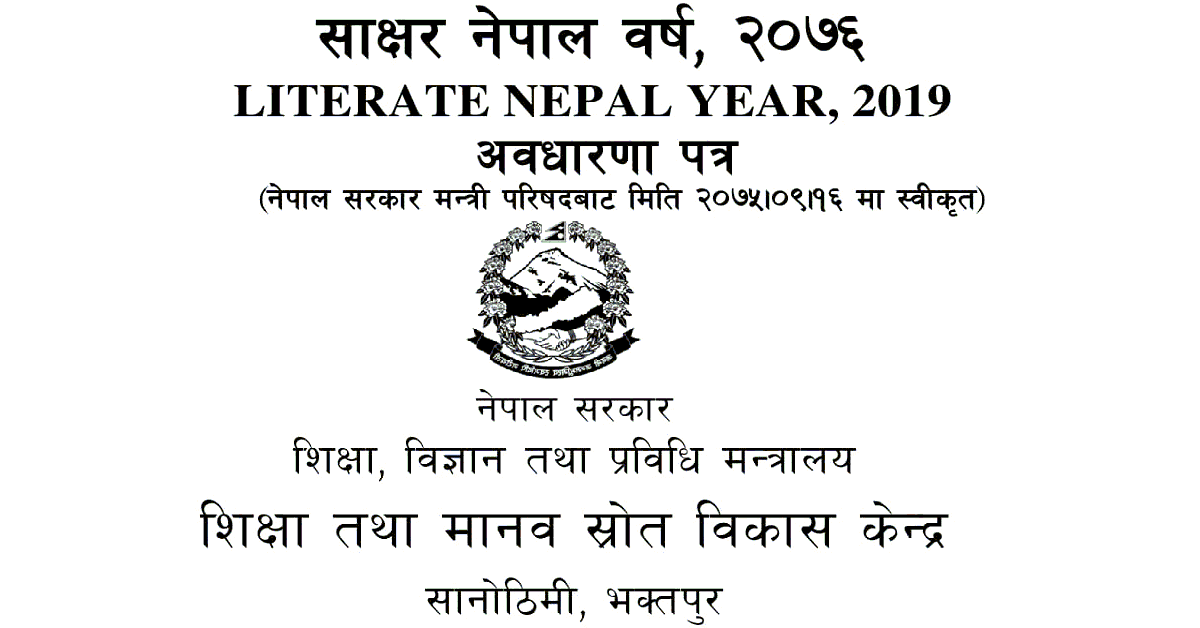
In Nepal, in 2065 BS and 2069 BS, twice a year, a total of 6 years of the national literacy campaign in collaboration with the government and non-government sectors, even following the global practice of the United Nations, 95 percent of the minimum age group of 15 to 60 years are literate. A policy that can be implemented is in progress. Out of the 77 districts of the country, 47 have already been declared literate by the end of 2075, with the goal of announcing literacy Nepal in all districts by 2030. Intensive literacy programs for the remaining 30 districts have also been conducted in the last financial years so that they can declare literacy. The Government of Nepal has adopted a policy to declare a "literate Nepal" within the next 2 years in the Budget Statement of the current Fiscal Year.
In order to achieve the goals of millennium development in the world, international commitment such as education for all and foreign aid of large sums have been launched under the UN declaration. Sustainable Development Goal-SDG, Goal of Sustainable Development 2030. 4 mentions the goal of "ensuring inclusive and equitable quality education for all and promoting lifelong learning opportunities."
To fulfill the declared goal of the Government of Nepal to declare "Literacy Nepal" within the coming year, literacy campaign for the rest of the district and local level based on past practice, achievements and experience, and the current material situation is required. For this, the concept paper for Literacy Nepal Year, 2076 (Literate Nepal Year, 2019) has been prepared as the basic guideline for the policy, norms, coordination and financial management required during the current financial year. This concept paper has been approved by the Council of Ministers of the Government of Nepal on 2075/09/16.
Deputy Director-General of the Education and Human Resource Development Center, Mr. Chudamani Poudel, Deputy Secretary to the Ministry of Education, Science and Technology, Shri Guruprasad Mainali, Deputy Secretary of the Ministry of Federal Affairs and General Administration, Mr. Balaram Timilsina, Head of UNESCO Kathmandu, Education cum Prof. The concept paper has been drafted by the committee, comprising Sushon Acharya Member and Director of the Center for Education and Human Resource Development, Shri Gehnath Gautam. In preparation for the retention paper, the feedback has been received by conducting workshops and meetings with the Minister of Education, Science, and Technology, Mr. Girirajmani Pokharel, Education Secretary Mr. Khagraj Baral, Director General, Shri Baburam Poudel, Joint Secretaries, staff, education media personnel and other stakeholders. While preparing the concept paper, the constitutional directives, lists of rights conferred on different levels and bodies according to the federal structure, mutual coordination, cooperation and partnership, and past experience and practice are considered as the basis.
With the necessary coordination, cooperation and partnership with the Government of Nepal, the State Government, NGOs, local partners, media workers, teachers, students, parents, political parties and civil society at the local level so that the Government of Nepal can be declared "literate Nepal" next year. The tasks needed to promote literacy must be initiated immediately. Finally, coordination, cooperation, partnership, and participation is expected from all in this campaign.
Background:
There are formal, informal, and additional ways to develop the knowledge, skills, and habits needed for human life. Literacy generally refers to the ability of a person to communicate by reading, writing or mathematical exercises, by writing information and information that is written in letters.
In all countries of the world, informal education is in some way considered as an integral part of the educational system. This system serves two purposes by refining, developing, updating and validating self-made knowledge skills and developing basic literacy skills (Capacity Development Campaign for Implementation of Informal Education System, Planning Direction, 2075). Literacy skills are the foundation for lifelong learning. Therefore, after the acquisition of literacy skills, the opportunity for lifelong learning should be ensured. Therefore, Nepal has a commitment to promote lifelong learning opportunities.
Literacy education in Nepal has traditionally been initiated through oral literacy through fundamental practices such as a recognized office, religious gathering, gurukul education. The formal launch of written literacy education began in the BS year 2004 with the introduction of Aadhaar education. After the 2008 BS, the work of making the general public literate began.
The "Education in Nepal" report, 2011 BS, has been implemented as a planned adult literacy program since the BS year 2013 after recommending me to emphasize adult literacy programs. Functional literacy was included from the year 2022 BS to integrate literacy education with the life course. After the mid-term assessment of the National Education System Scheme, 2028 BS, the literacy program was made even wider. Adult Education Branch has been established in the Ministry of Education since 2037 BS and expanded literacy education through the institutional structure.
During the implementation phase of the Seti education project for rural development in 2038 BS, women and adolescents started conducting targeted activities while adult literacy was expanded with occasional improvement. To accelerate the systematic campaign to eradicate illiteracy, the National Literacy Campaign was launched in 2045 BS.
Along with their efforts in each country, the Millennium Development Goal (MDG), together with the Millennium Development Goal-MDG, adopted six objectives for Education for All - EFA from the Dakar Conference of the United Nations World Education Forum in 2000 AD. It aims to ensure that all children have access to quality, free and compulsory primary education by 2015 AD, and aims to improve all children's access to basic and continuing education and life skills by 50 percent.
Using the statistics of literacy in the national census of 2058 BS year, the facts were published in the National Census of 2068 BS from different dimensions of literacy. From the then Ministry of Education, Informal Education Center In the year 2067 BS, land surveys of every illiterate citizen were collected by collecting anonymity details of the citizens.





